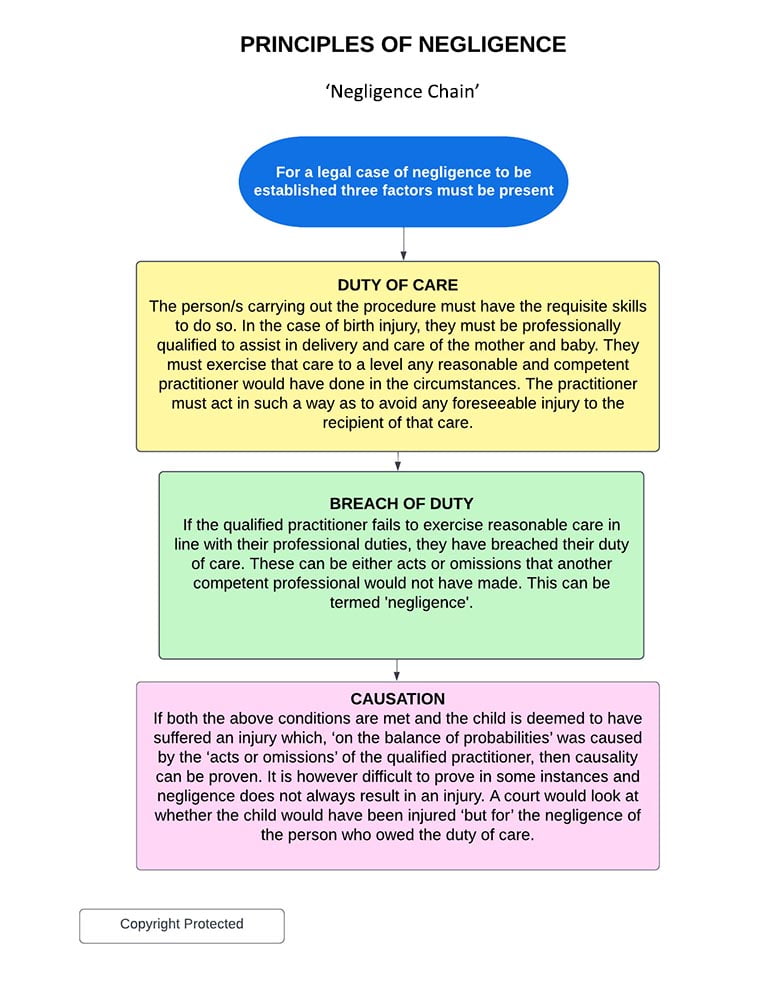
(Source Browne: GCSE LAW)
The Legal Chain of Causation
Duty of Care and Breach of that Duty
The first element of negligence is the legal duty of care. This concerns the relationship between the defendant and the claimant, which must be such that there is an obligation upon the defendant to take proper care to avoid causing injury to the plaintiff in all the circumstances of the case. In this section I will only concentrate on circumstances which are likely to be relevant to a case of birth injury.
The defendant and claimant are within one of the recognised relationships where a duty of care is established by precedent. Such a relationship is one between a doctor/midwife/nurse and their patient. The practitioner is defined as a skilled specialist.
The general standard applied to specialists is therefore that of a “reasonable professional”. This is actually a very important aspect and what it means is that your obstetrician or midwife must act according to recognised best practice as accepted by a ‘group of their peers’ This could mean if they made the same mistake a ‘group of their peers’ would have made in the same circumstances, then it may not be considered negligent. This circumstance does not happen often, but it may be a defence.
Was the harm reasonably foreseeable? Did they do something or omit to do something that could cause harm? Could that harm have been avoided if they had acted as a group of their peers would have acted in similar circumstances?
Was there a requisite degree of proximity between the claimant and the defendant? Was the patient being cared for directly by the midwife or doctor who may have caused the injury? Remember, it is not the individual you are claiming against, it is against the Trust that employs them as they take on liability for their employees.
Causation
In the English Law of negligence, causation proves a direct link between the defendant’s negligence and the claimant’s loss and damage. For these purposes, liability in negligence is established when there is a breach of the duty of care owed by the defendant to the claimant that causes loss and damage, and it is reasonable that the defendant should compensate the claimant for that loss and damage.
Put simply, did the doctor or midwife caring for you do something wrong, or omitted to do something of importance in your care, and that act or omission caused harm to your baby? Or, ‘but for’ the poor care, would the injury have occurred? If no injury would have occurred or injury could have been avoided ‘but for’ the act or omission, then it is regarded as negligent.
So to determine negligence the person providing care must
Owe a duty of care; have breached that duty of care; and that breach of care has caused the injury.
Something also to be aware of, is that if the baby survives and is unscathed despite there being clear negligence, there will be no case because the chain of causation/negligence is broken. However babies often do not show injury initially, and can develop epilepsy, be hearing impaired or have a learning disability, which will not show up immediately.
A birth injury claim brought by the parents can be brought any time between birth and the age of 18. If after this time the child has capacity, they can bring a case on their own behalf in the 3 years until they are 21. If the affected person becomes aware of the negligence after the age of 21, they can bring a case but they must do so within 3 years of the date on which they first knew of the negligence. Speak to a solicitor for clarification.
What is a Birth Injury Claim?
So, what exactly is a birth injury claim? Birth Injury negligence falls under the umbrella term, clinical negligence. This all falls under Civil Law, as opposed to Criminal Law.
For a clinical negligence claim to succeed the above factors must be present. They can include such things as failure to diagnose, failure to treat/refer, delay in treatment, substandard care/treatment, failure to recognise infection and so on.
The reason to bring a claim may include compensation, to provide answers, so that the hospital can learn etc. The subsequent investigation could result in disciplinary proceedings against the doctor or midwife, but this is not something you have any control over. In most cases the people involved are simply given extra training or temporary supervision.
